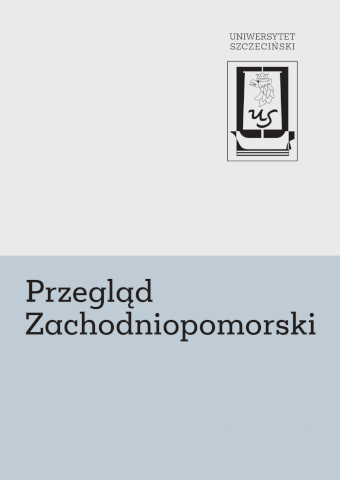| 1. | Źródła |
| 2. | Augustyn ze Stargardu zw. Angelusem, Protokół. Kamieńska kronika – rodowód książątpomorskich. Tzw. Stargardzka Genealogia, tłum. E. Buszewicz, Stargard 2008. |
| 3. | [Kantzow T.], Pomerania: eine pommersche Chronik aus dem sechzehnten Jahrhundert,t. 1–2, red. G. Gaebel, Stettin 1908. |
| 4. | Kantzow T., Pomerania oder Ursprunck, Altheit und Geschicht der Völker und Lande Pomern, Caßuben, Wenden, Stettin, Rhügen in 14 Büchern, t. 1, Greifswald 1816. |
| 5. | Opracowania |
| 6. | Anderson B., Wspólnoty wyobrażone, tłum. S. Amsterdamski, Kraków 1997. |
| 7. | Blume H., Thomas Kantzows Hochdeutsch. Zum Sprachstand der ersten hochdeutschen Fassung seiner Pommerschen Chronic, w: Pommern in der Frühen Neuzeit.Literatur und Kultur in Stadt und Region, red. W. Kühlmann, H. Langer, Tübingen 1994, s. 171–185. |
| 8. | Burke P., Renesans, Kraków 2009. |
| 9. | Fenrych W., Kroniki Jana Bugenhagena i Tomasza Kantzowa o dziejach Pomorza Zachodniego w latach 1370–1464. Studium z zakresu ideologii politycznej, Szczecin 1965. |
| 10. | Goody J., Renesans – czy tylko jeden?, Warszawa 2012. |
| 11. | Grabski A.F., Dzieje historiografii, wyd. II, Poznań 2006. |
| 12. | Gruchała J.S., Iucunda Familia Librorum. Humaniści renesansowi w świecie książki, Kraków 2002. |
| 13. | Helmrath J., Die Umprägung von Geschichtsbildern in der Historiographie des europäischen Humanismus, w: Von Fakten und Fiktionen. Mittelalterliche Geschichtsdarstellungen |
| 14. | und ihre kritische Aufarbeitungen, red. J. Landage, Köln–Wien 2003, s. 323–352. |
| 15. | Historia Pomorza, t. 2, cz. 1, red. G. Labuda, Poznań 1976. |
| 16. | Landesbeschreibungen Mitteleuropas vom 15. bis 17. Jahrhundert., red. H.-B. Harder, Köln–Wien 1983. |
| 17. | Leder H.-G., Johannes Bugenhagens Pomerania – Humanistische Einflüsse auf die frühe Landesgeschichtsschreibung in Pommern, w: Pommern in der Frühen Neuzeit. Literatur und Kultur in Stadt und Region, red. W. Kühlmann, Tübingen 1994, s. 77–99. |
| 18. | Małecki A., Mity etnogenetyczne w samoświadomości historycznej na przykładzie historiografii polsko-niemieckiego pogranicza w XVI w., „Sensus Historiae” 2011, nr 2, vol. III, s. 35-53. |
| 19. | Marciniak R., Zachodniopomorska legenda etnogenetyczna w średniowieczu, „Materiały Zachodniopomorskie” 1973, t. XIX, s. 511–525. |
| 20. | Mierzwa E.A., Historiografia niemieckiego Renesansu i Reformacji,„Piotrkowskie Zeszyty Historyczne” 2008, t.9, s. 165–192. |
| 21. | Migdalski P., Jak słowiańscy przodkowie Pomorzan stali się Germanami. Mit pochodzenia pierwotnych mieszkańców Pomorza Zachodniego w XVI i początkach XVII wieku, „Przegląd Zachodniopomorski” 2016, z. 1, s. 199–218. |
| 22. | Petersohn J., Die dritte hochdeutsche Fassung von Kantzows Pommerscher Chronik. Identifikation eines verkannten Geschichtswerkes, „Baltische Studien” 1973, t. 59, s. 27–41. |
| 23. | Pomian K., Przeszłość jako przedmiot wiary. Historia i filozofia w myśli średniowiecza, Warszawa 1968. |
| 24. | Pomian K., Przeszłość jako przedmiot wiedzy, Warszawa 1992. |
| 25. | Pommern in der Frühen Neuzeit. Literatur und Kultur in Stadt und Region, red. W. Kühlmann, Tübingen 1994. |
| 26. | Rymar E., Wstęp, w: Augustyn ze Stargardu zw. Angelusem, Protokół. Kamieńska kronika – rodowód książąt pomorskich. Tzw. Stargardzka Genealogia, tłum. E. Buszewicz, Stargard 2008. |
| 27. | Scheibe M., Formen pommerschen Geschichtsbewusstseins im 14. Jahrhundert, w: Tausend Jahre Pommersche Geschichte, red. R. Schmidt, Weimar–Wien 1999, s. 85–124. |
| 28. | Schmidt R., Die „Pomerania” als Typ territorialer Geschichtsdarstellung und Landesbeschreibung des 16. und beginnenden 17. Jahrhunderts (Bugenhagen – Kantzow – Lubinus), w: Landesbeschreibungen Mitteleuropas vom 15. bis 17. Jahrhundert., red. H.-B. Harder, Köln–Wien 1983, s. 49–71. |
| 29. | Schulze H., Państwo i naród w dziejach Europy, tłum. D. Lachowska, Warszawa 2012. |
| 30. | Strzelczyk J.,Tomasz Kantzow jako historyk na tle epoki, w: T. Kantzow, Pomerania, t. 1, tłum. K. Gołda, Szczecin 2005, s. 11–33. |
| 31. | Szacki J., Tradycja, wyd. II, Warszawa 2011. |
| 32. | Tausend Jahre Pommersche Geschichte, red. R. Schmidt, Weimar–Wien 1999. |
| 33. | Von Fakten und Fiktionen. Mittelalterliche Geschichtsdarstellungen und ihre kritische Aufarbeitungen, red. J. Landage, Köln–Wien 2003. |
| 34. | Walczak R., „Protocollum” augustianina-eremity zwanego Angelusem ze Stargardu. O polsko-pomorskich związkach historiograficznych w średniowieczu, Poznań 1991. |
| 35. | Weber M., Zur Konzeption protonationaler Geschichtsbilder. Pommern und Schlesien in geschichtlichen Darstellungen des 16. Jahrhunderts, w: Die Konstruktion von Vergangenheit, Geschichtsdenken, Traditionsbildung und selbstdarstellung in frühneuzeitlichen Europa (Zeitschrift für Historische Forschung, Beiheft 29), red. J. Bahlcke, A. Strohmeyer, Berlin 2002, s. 55–79. |
| 36. | Zonenberg S., Kronika Szymona Grunaua, Bydgoszcz 2009. |







